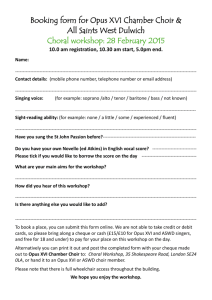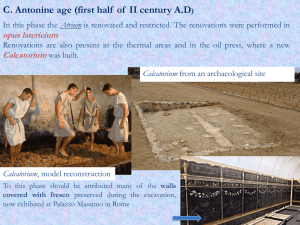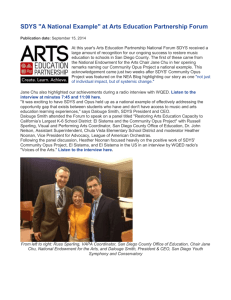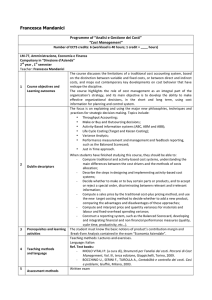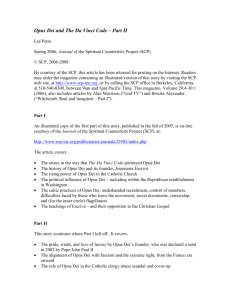RELIGIOUS LIFE - Saint Factory
advertisement
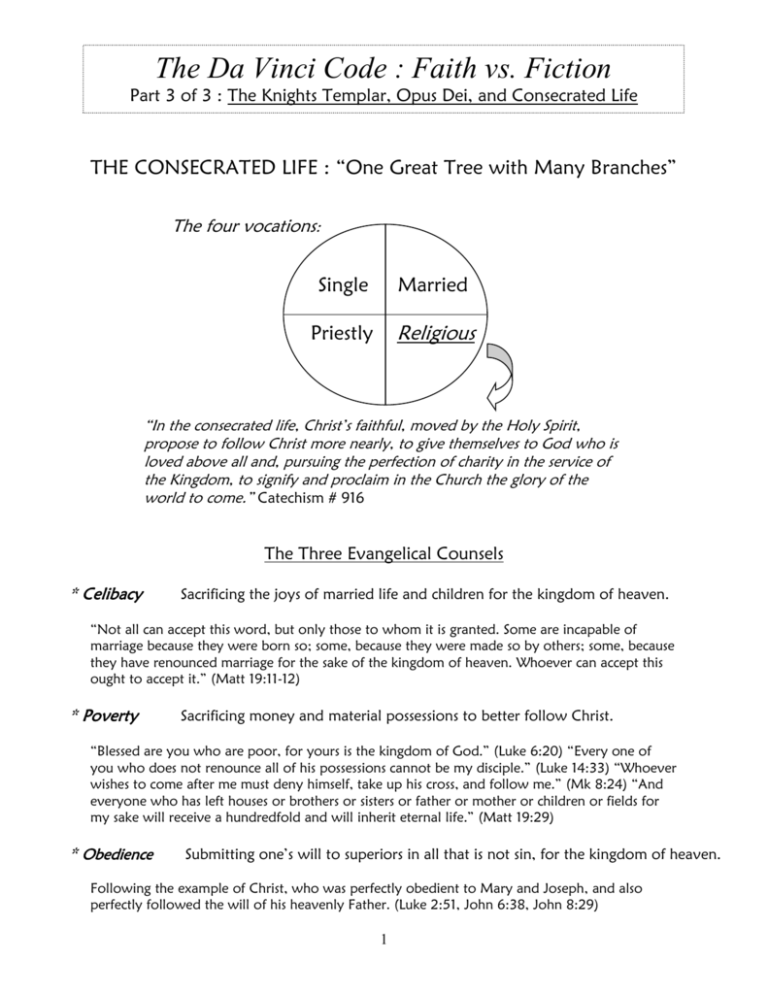
The Da Vinci Code : Faith vs. Fiction Part 3 of 3 : The Knights Templar, Opus Dei, and Consecrated Life THE CONSECRATED LIFE : “One Great Tree with Many Branches” The four vocations: Single Married Priestly Religious “In the consecrated life, Christ’s faithful, moved by the Holy Spirit, propose to follow Christ more nearly, to give themselves to God who is loved above all and, pursuing the perfection of charity in the service of the Kingdom, to signify and proclaim in the Church the glory of the world to come.” Catechism # 916 The Three Evangelical Counsels * Celibacy Sacrificing the joys of married life and children for the kingdom of heaven. “Not all can accept this word, but only those to whom it is granted. Some are incapable of marriage because they were born so; some, because they were made so by others; some, because they have renounced marriage for the sake of the kingdom of heaven. Whoever can accept this ought to accept it.” (Matt 19:11-12) * Poverty Sacrificing money and material possessions to better follow Christ. “Blessed are you who are poor, for yours is the kingdom of God.” (Luke 6:20) “Every one of you who does not renounce all of his possessions cannot be my disciple.” (Luke 14:33) “Whoever wishes to come after me must deny himself, take up his cross, and follow me.” (Mk 8:24) “And everyone who has left houses or brothers or sisters or father or mother or children or fields for my sake will receive a hundredfold and will inherit eternal life.” (Matt 19:29) * Obedience Submitting one’s will to superiors in all that is not sin, for the kingdom of heaven. Following the example of Christ, who was perfectly obedient to Mary and Joseph, and also perfectly followed the will of his heavenly Father. (Luke 2:51, John 6:38, John 8:29) 1 THE MONKS OF WAR The Poor Knights of the Temple (a.k.a. The Knights Templar) “You especially are charged with the duty of giving your souls for your brothers, as did Jesus Christ, and of defending the land from the unbelieving pagans who are the enemies of the son of the Virgin Mary.” – Rule of the Templars #56 Historical Context 1070 Jerusalem taken by Turks (stopping Christian pilgrimages to the Holy Land) 1095 Pope Urban II calls the first Crusade. 1099 Crusaders retake Jerusalem and establish the Crusader states in the East. 1118 “Poor Knights of the Temple” founded in Jerusalem by Hugues de Payens & companions. 1128 The knights receive their Rule and their habit at the Council of Troyes (France). 1139 Received papal bull of approval, making them subject directly to the Holy Father. Mission : * To defend the Holy Land pilgrims. * To protect the Crusader States. * To live a life of prayer. - “Half Monk, Half Knight”: - Took the three evangelical vows (celibacy, poverty, obedience), plus the Crusader vow. - Their castles resembled a mix between a monastery and a military barracks. - Living like a Monk : Prayed the liturgy of the hours, were tonsured, heard Scripture during lunch and dinner, ate meat only three times a week, fasted often, grand silence after night prayer, etc. - Living as Christ-like knights : 2 Forbidden to hunt or joust; only simple, unadorned weaponry and armor; no more than three horses and one squire per knight; one may not beat his squire; etc. 3 Organization of the Knights Templar: KNIGHTS Equipped like the heavy cavalry of the Middle Ages; made up only a small, elite part of the order; wore white habit with red cross. SERGEANTS Equipped like the light cavalry of the Middle Ages; made up the bulk of the fighting brethren; wore brown or black habit. CHAPLAINS Priests of the order, attended to their spiritual needs. LAY ASSOCIATES Lay members, attended to the material care of the order. Success! - Marvelous growth throughout the 12th and 13th century - Famed for their fearlessness as warriors in the East - Blessed with many recruits and benefactors Soap-Opera Ending: 1291 – Order Obsolete. Christians driven from the Holy Land, making the order obsolete. 1307 – French Arrest. On Friday October 13th, about 150 Templar Knights in France are arrested, taken into custody, and questioned by torture on orders of King Philip IV. Learning of the arrest, Pope Clement V halts the interrogations and suspends those church authorities involved. 1308 – Reopened Trial. The investigations are reopened under the pope’s direction. In most countries, the Templars are found innocent and released. In France, though, 54 knights are executed. 1312 – Order Dissolved. Order is dissolved by Pope Clement V; its holdings are split up between the other military orders. Former Templars are permitted to join other military orders or retire on pension. Philip IV and Clement V both die the following year. 4 THE WORK OF GOD a.k.a. Opus Dei 1928 : Founded by Spanish priest Josemaría Escrivá (1902-1975) 1950 : Given official approval by Pope Pius XII. 1975 : Escrivá dies, leaving Opus Dei some sixty thousand members strong. 1982 : Pope John Paul II establishes Opus Dei as a personal prelature (meaning that it operates like a special diocese that includes all Opus Dei members in the world) 1992 : Pope John Paul II beatifies Josemaría Escrivá at St. Peter’s Square in Rome to a crowd of over 300,000. Today : Currently over eighty thousand members throughout the world. The Spirit of Opus Dei * Holiness through ordinary life “Holiness is not only for priests and nuns. It is the obligation of all Christians to seek holiness. And for lay Christians, we have to seek it right where we are, in the ordinary circumstances of our lives. We don’t seek holiness despite the activities of our ordinary life as lay people, but precisely through those activities.” - Matthew G. Collins, Opus Dei member “The Christian vocation consists in making heroic verse out of the prose of each day. Heaven and earth seem to merge on the horizon. But where they really meet is in your hearts, when you sanctify your everyday lives.” – St. Josemaría Escrivá * The sanctity of work Christ, who spent most of his life as a carpenter, shows us that a Christian’s daily work can be an occasion of giving glory to God and serving others. When we offer our everyday tasks to the Lord, He blesses them and makes them a means to grow in holiness. 5 “Ordinary life can be holy and full of God … Our Lord is calling us to sanctify the ordinary tasks of every day, for the perfection of the Christian is to be found precisely there.” – St. Josemaría Escrivá * Prayer and Sacrifice Opus Dei members follow a prescribed “Plan of Life” to help them grow in holiness. This plan includes all the “goodies” of our Catholic spirituality—prayers and practices that are recommended to all of us: - Personal prayer (a morning offering upon wakening, 30 minutes of mental prayer in morning and evening, rosary, visits to the Blessed Sacrament, examination of conscience before bed, and spontaneous little prayers throughout the day) - Daily Mass - Daily meditation on the New Testament and other spiritual reading - Acts of penance - Confession once a week - Group prayer with other members weekly - Spiritual direction - A day of recollection every month; a retreat every year “You wrote to me: ‘To pray is to talk with God. But about what?’ About what? About him, and yourself: joys, sorrows, successes and failures, great ambitions, daily worries—even your weaknesses and acts of thanksgiving and petitions—and love and reparation. In short, to get to know him and to get to know yourself— ‘to get acquainted!’” - from The Way by St. Josemaría Escrivá * Evangelization Opus Dei stresses that its members bear witness to their Christian faith through their daily example. Writes Escrivá, “As we work at our job, side by side with our colleagues, friends and relatives and share their interests, we can help them come closer to Christ.” 6 Opus Dei also operates many apostolates throughout the globe; for example, “schools, universities, vocational training centers, medical clinics, farming schools, and student residencies.” These are operated “to provide a genuine service to the community, to promote the ideal of sanctity in one’s ordinary life … and to promote the Gospel message.” (Collins) Types of Members within Opus Dei (Reflect varying levels of availability) Numeraries - celibate and usually live in Opus Dei houses - have normal jobs in the world - give their salaries to the community - ready to move wherever the prelature needs them Associates - celibate but usually do not live in Opus Dei houses - (usually due to personal, family, or professional obligations) - have normal jobs in the world Supernumeraries - may be married - live with their families - follow the same prayer commitments - contribute financially to the apostolic works of Opus Dei Cooperator - benefactors who are not members of Opus Dei - support Opus Dei through their prayer, alms, and service - can include non-Catholics The members of Opus Dei : * include all walks of life—high-level professionals to everyday manual workers * include both men and women, who live in separate communities within Opus Dei houses * maintain normal relationships with their local parish, except that: - they receive spiritual direction from within Opus Dei - they are encouraged to confess to Opus Dei priests 7 * do not make vows, only promises - wrote Escrivá : “We are interested in virtue, not vows.” - A year-long promise renewed each March. - After five years, numerary candidates make a lifelong commitment to Opus Dei. 8 The Da Vinci Code and the Knights Templar Code: The Knights Templar were formed as the “military arm” of a secret organization whose “true goal in the Holy Land” was to retrieve secret documents from beneath the ruins of Solomon’s temple. The idea of protecting pilgrims was just a cover story, a “guise.” (DVC 158) Truth: This idea isn’t even logical on its own terms. For example, how and why would the “true Christians” have hidden these documents (such as Magdalene’s personal diaries and the writings of Jesus himself) under the ruins of Herod’s temple, occupied by the Romans, rather than in some hiding place under their own control? Protecting the pilgrims was not a “guise”; it was the Knight’s entire reason for existence, and thousands died bravely doing just that. ----------------------------------- Code: The equilateral crosses worn by the Templars symbolize gender balance and “convey the natural union of male and female.” (DVC 145) Truth: There is nothing unusual or pagan about such a cross; in fact it was selected by the pope for the Templar habit. It was a common medieval symbol that was also used by several other medieval military orders. (Olson & Miesel, 195) ----------------------------------- Code: The Templars expanded so rapidly because it “blackmailed the Vatican” and forced the pope to issue “an unprecedented papal bull” that gave them “limitless power.” (DVC 159) Truth: There is no need to allege blackmail in order to explain the explosive growth of the Templars. Many religious orders have experienced such growth throughout the Church’s history, such as the Franciscans, the Jesuits, etc. Likewise, many orders had received such papal approval, such as the Order of Cluny and the Hospitalers. This approval was not unique to the Templars and did not make them “a law unto themselves” as the novel claims, it simply made them answerable to the papacy instead of to the local bishops. (Olson & Miesel, 196-197) ----------------------------------- Code: Circular architecture is considered pagan, built in honor of the sun, since it is not in the traditional Christian cruciform layout. The architecture of the Knights Templar, such as its round church in London, was “pagan to the core”, “pantheonically pagan.” (DVC 339) Truth: There is no intrinsic connection between roundness and paganism. While the Pantheon in Rome (cited by Brown) was round, most Greek and Roman temples were rectangular in shape. Likewise, there have been round churches built by Christians throughout history. Furthermore, few of the churches built by the Templars were circular. Those that were round were most likely inspired by the famous Dome of the Rock located in Jerusalem on Temple Mount. (Olson & Miesel, 201) 9 10 The Da Vinci Code and Opus Dei * “Opus Dei is a personal prelature of the Pope himself” (DVC 30) The word “personal” in “personal prelature” does not refer to any personal relationship or ownership between Opus Dei and the pope, as this and similar quotes from The Da Vinci Code would lead one to believe. Opus Dei doesn’t belong to the pope any more than the Diocese of Charleston does. Rather, “personal” refers to the fact that its jurisdiction is defined not by geographical boundaries but by people (the members of Opus Dei). * Silas the “albino monk” of Opus Dei (DVC 278) Here the novel betrays its fundamental unfamiliarity with Opus Dei, which does not have monks. It is not a religious order; thus they do not take vows (DVC 73), they do not wear a habit (such as Silas’ “ankle-length, hooded robe … made of dark wool” DVC 31), nor do they live cloistered in Opus Dei houses. That is the whole point of Opus Dei—they are not called to spend all day praying like monks, but to grow in holiness through their ordinary jobs in the world! * “Opus Dei is the only Catholic organization whose numbers are growing!” (DVC 416) This claim, spoken by the novel’s Opus Dei bishop, is so ridiculous it is laughable. There are tons of Catholic groups who are growing by leaps and bounds—Mother Teresa’s Sisters of Charity and the Legionaries of Christ come to mind. This is a subtle yet very misleading statement for a novel that prides itself on its “facts.” * John Paul II made Opus Dei into a personal prelature in 1982 and put its founder on the “fast track for sainthood” due to a billion-dollar loan from Opus Dei and other suspicious activities (DVC 40-41). Mr. Brown does not give any evidence for such fantastic accusations. Why insist on a conspiracy theory, when we can rather see these events as the genuine enthusiasm of our Holy Father for Opus Dei and its founder? Mother Teresa was beatified in the shortest time in recent history—only six years after her death—are we to imagine that this was because of sneaky behind-the-scenes financial transactions as well? Q: There are many accusations raised against Opus Dei : that it is “secretive”, that it is a “cult”, that its members use aggressive or misleading recruitment tactics, that it encourages alienation from one’s family, and that it encourages misguided and excessive corporal mortification. Is there truth to this? A: Opus Dei is very beloved by our saintly pope, John Paul II, and many other bishops around the world, so it seems to me that it cannot be the evil and dubious organization that such critics make it out to be. Opus Dei presents its members with a very high standard for living the Gospel in everyday life. The reality is probably that the vast majority of Opus Dei members and organizations live their vocation in a good and holy way. But since its members are human, it is not unimaginable that some have failed in their vocations by living the Opus Dei ideal in a wrong or harmful way, and given the rest of the organization a bad name. This would explain the bad experiences of some individuals with the group (such as those found on www.odan.org.) This just shows us that the Catholics of Opus Dei, like all members of the Church, need our prayers and the grace of God to live their vocations faithfully. 11 FOR MORE INFORMATION: My low-tech website : www.catholicheart.com Contains reflections that I have written, like the one on the following page, as well as an information page on The Da Vinci Code with my class notes and links to books and articles. Knights Templar Resources “Ancient Templar Rule of Order” – an excerpt of the English translation of the Templar’s rule www.ordotempli.org/ancient_templar_rule_of_order.html “The Rule of St. Benedict Compared with the Rule of the Templars” by Steven Grobschmidt online at : http://www.cav-templarios.hpg.ig.com.br/religious_orders.htm Catholic Encyclopedia ( www.newadvent.com): “Knights Templar”, “Crusades”, “Military Orders” Opus Dei Resources Official Website of Opus Dei : www.OpusDei.org Contains great information about their history and spirituality, as well as a very interesting response to The Da Vinci Code. “Trust the Truth: Matt’s Opus Dei FAQ” Answers to frequently asked questions from Opus Dei supporter Matthew G. Collins www.interbit.com/blogger/OpusDeiFAQ.html#q1 “Opus Dei in the United States”: James Martin, S.J. An article by a Jesuit priest about the controversy surrounding Opus Dei in the United States. www.americamagazine.org/articles/martin-opusdei.cfm Online articles on The Da Vinci Code “Dismantling the Da Vinci Code” – Sandra Miesel, Crisis Magazine, Sept 2003 www.crisismagazine.com/september2003/feature1.htm “Cracking the Anti-Catholic Code” – Carl E. Olsen, Envoy Magazine www.envoymagazine.com/planetenvoy/Review-DaVinci-Part1.htm “J. P. Holding on The Da Vinci Code”—a very interesting review by a Protestant apologist 12 http://www.tektonics.org/davincicrude.htm 13 God in the Ordinary by Andrew Trapp Last summer I was able to participate in a small biblical skit from the Song of Songs. This Old Testament book takes the form of a love story between a bride and her beloved, and is written in very physical and intimate poetic language. It gives us insight into the true meaning of marriage, as well as God’s tender love for us his people. We enacted this small segment from chapter five of the Song of Songs : It is the middle of the night and the bride is asleep in her home, when she awakes to a knock on the door. It is her beloved, who traveled through the night to see her. He calls out, “Open to me, my beloved, my dove, my perfect one! For my head is wet with dew, my hair wet with the moisture of the night!” But she hesitates and does not answer his call. She has already gotten ready for bed and she has already bathed her feet . . . can’t he come back tomorrow morning? Then a short time later, having a change of heart, she springs out of bed and flings open the door—but her beloved is nowhere to be found. He could have entered the house without her permission, but he respected her and did not desire to enter unwanted. He had already turned reluctantly away and left. I have found this image from Song of Songs to be a helpful metaphor for how God comes to us in our everyday lives. We want God to visit us, but we often tend to expect Him to come only on our time, when we make time for Him (Sunday at church, our daily prayer time, etc.) But God cannot be boxed in so easily. He does indeed meet us in our times of prayer, but like the bride’s beloved, He also comes to us when we least expect Him—at every hour of the day, and indeed even in the middle of the night! Likewise, when He comes, God usually does not come loudly, bulldozing into our lives as if to say, “Look! I Am Who Am has arrived!” No, the Lord usually comes quietly, unassumingly… just a quiet knock on the door of our hearts. After all, isn’t this how Jesus came into our world? He could easily have come to earth in a glorious descent from heaven, surrounded by millions of angels for the entire world to see. But instead, God entered our world quietly, a seemingly ordinary baby born in the most humble of circumstances. And Jesus lived his life on earth in the same way—meeting his disciples wherever they were, in the midst of their everyday lives and experiences. Through the Holy Spirit, Jesus still desires to meet us today in this same quiet, ordinary manner, in the midst of our everyday lives. Peter and Andrew first encountered Jesus in the midst of a normal day of fishing—certainly Jesus can meet us in our daily work in the office, the classroom, the home? The Samaritan woman met Jesus while drawing water at the well, a task she must have done thousands of times—certainly Jesus can speak to us in the grocery store, in a mall, at the in-law’s house? Peter’s mother encountered the Lord as she lay stricken with a deadly fever—certainly Jesus can touch our hearts in the midst of our illnesses and everyday sufferings, both big and small? The Lord is always knocking, but we have to be listening to hear him… Through a little child, through an annoying co-worker, through a complete stranger. Through an unexpected compliment, through a beautiful sunset, through a little ant crawling along the sidewalk. Nothing is too ordinary, too “normal” for God to reach us through. After all, how else can God reach us, if not through the ordinary? What else is there for Him to reach us through, if not the world in which He has created us? The Lord, our beloved, is knocking. Will we open up the door? 14
